Einat Admony’s Preserved Lemons
From a backyard lemon tree to a jar of citrus gold, here's a savory recipe to elevate your cooking
By Janna Gur
Published Feb 2, 2023
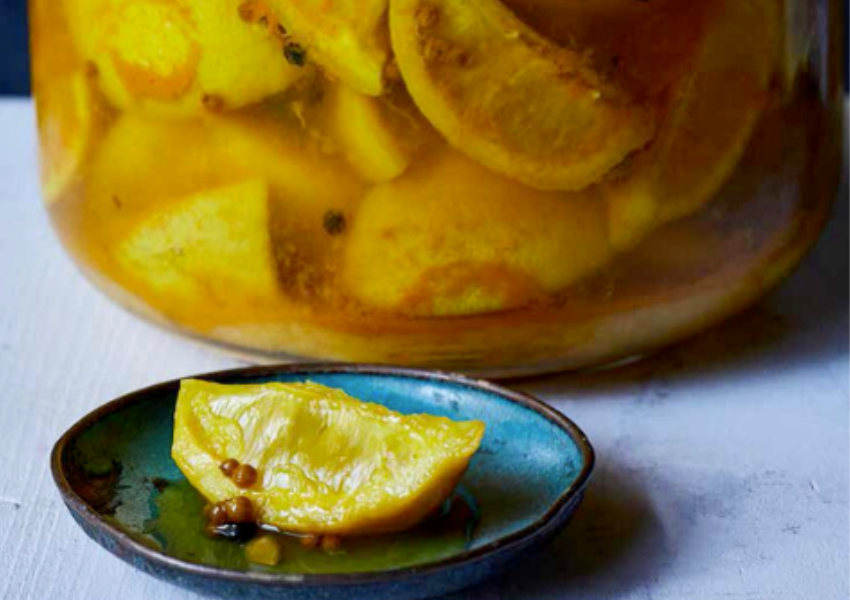
Preserved lemons
COURTESY QUENTIN BACON
I grew up in Riga, Latvia (when it was still part of the Soviet Union), and our most beloved holiday was Novy God (New Year’s Eve in Russian). It was the only holiday devoid of a political agenda, or a religious one for that matter, just a joyous family party accompanied by a lavish meal (by Soviet standards).
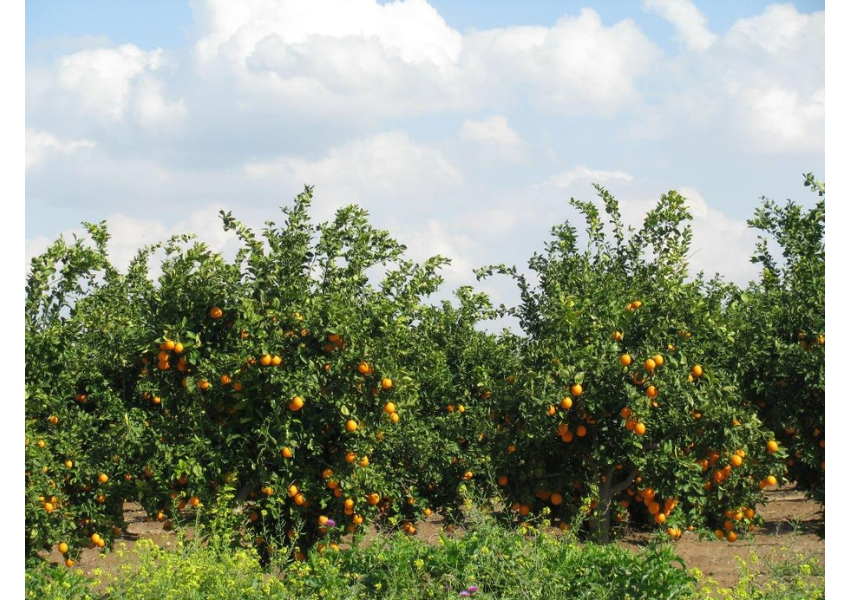
Orange groves heavy with fruit
COURTESY JANNA GUR
The centerpiece of the holiday table was a cut glass bowl with oranges – just a few, because they were frightfully expensive. Usually two or three guests would share one fruit, slowly savoring each juicy segment. The smell of orange peels is forever linked in my mind to this childhood celebration. When, at the age of 16, I immigrated with my family to Israel, I was surprised that in the land of oranges, people prefer to munch on tangerines. Oranges are mostly used for juice, cooking, and baking.
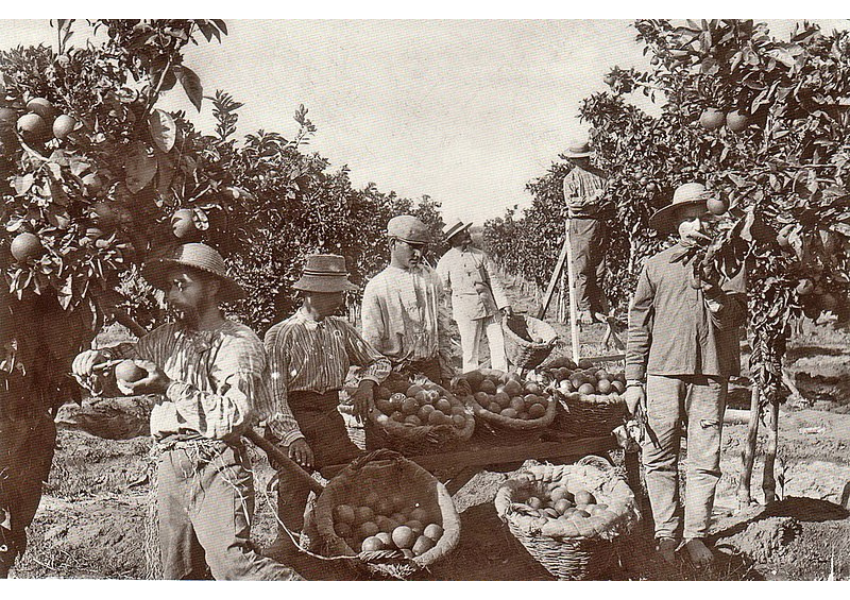
Orange picking in Palestine in the 1920s
COURTESY WIKIPEDIA
Many fruits that grow in Israel have interesting stories behind them, but none is as intimately woven into the fabric of local history as oranges. The most iconic ones are, of course, Jaffa oranges. Accidentally discovered by an Arabic citrus grower in the late 19 century, they have evolved into one of the leading symbols of local agriculture and Zionist iconography. Read more about the rise and fall of Israeli oranges in the article I wrote for Tablet.
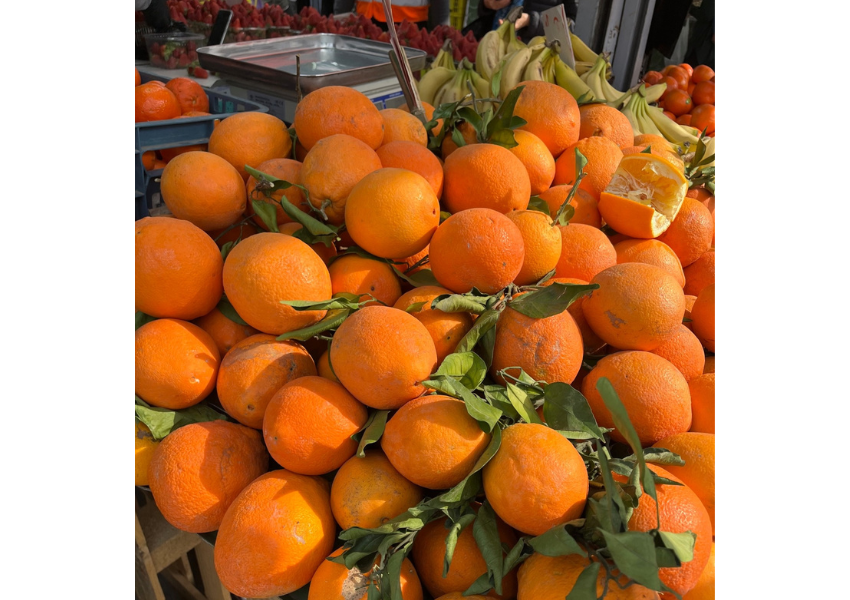
Fields of gold at the Carmel Market
COURTESY JANNA GUR
All manner of citrus fruits dominate Israeli autumn and winter markets. Dappled yellow–green Michal tangerines are first to hit the stalls, followed by tart and juicy early strains of oranges and exceptionally aromatic lemons. As the season progresses the whole citrus family makes its glorious appearance on the stalls, including the famed Jaffa oranges, grapefruit (white and pink), pomelo and – my personal favorite – blood oranges.
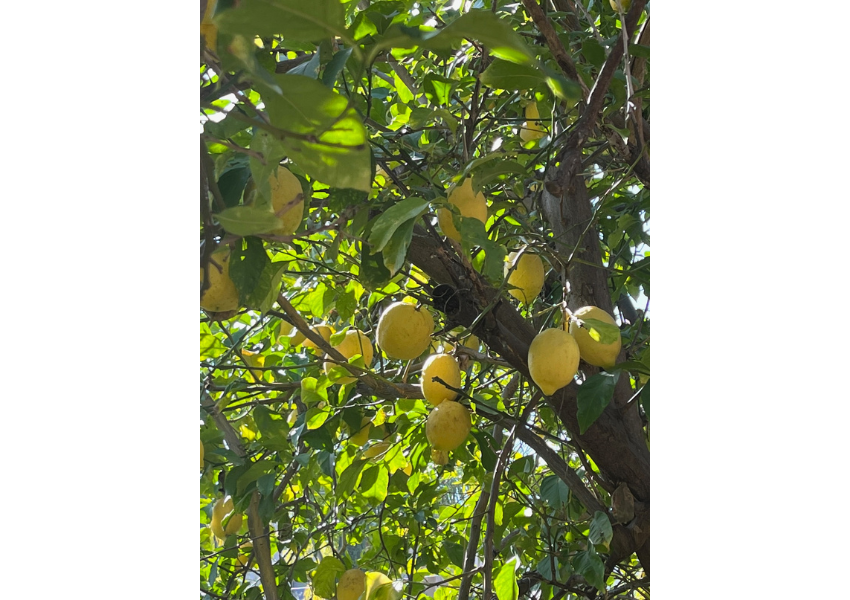
Janna's lemon tree
COURTESY JANNA GUR
Mother Nature usually gets it right, but there are occasional blunders. Lemons are a good case in point. In summer, when we need them the most for salads and other light fare, and when we crave them during those longs sweltering days, they are at their worst. Sold out of lengthy cold storage, they have hardly any aroma and very little juice. In autumn and winter, they are gorgeous – juicy and bursting with fragrance.
How to use preserved lemons
If you are lucky to have your own lemon tree in the backyard (like I do) you just don’t know what to do with all this bounty. The obvious answer is to pickle them, so you will have a supply of citrusy goodness until fresh lemons are in season again. Actually, you will have much more. Like with so many other preserves, pickling not only prolongs a lemon’s shelf life, but also transforms them into a delicious and versatile pantry item. Pickled lemons (aka Moroccan lemons) are less tart than fresh ones, but packed with lemony flavors, accented by spices: paprika, coriander, turmeric, pepper, and even cinnamon. If the lemons are used for garnish or chopped, discard the pulp and use the rind. If you add them to stews, roasts, braises, or puree them to make a dressing, use the whole wedge, but make sure you remove the pits first.
Einat Admony, a dear friend and a terrific chef, took one look at my lemon tree and demanded a knife, a clean jar, and a bunch of spices. Fifteen minutes later, a hefty jar full of bright yellow lemon wedges dotted with spices graced my kitchen shelf. Her excellent recipe made its way to Shuk, the book we co-authored. Now I make a fresh batch every winter, just the way she taught me.
If you have lots of lemons, you can double and triple the amounts. If you are worried that you wouldn’t know what to do with all these pickles, don’t be. Once you discover their magic, you won’t stop using them. Plus, they make great foodie presents. Make sure the glass jars you use are squeaky clean (wash them thoroughly with soapy water) and dry.
Einat’s Preserved Lemons Recipe
(Makes one large jar/about a gallon)
Ingredients:
3 cups kosher salt
½ cup sugar
½ tablespoon coriander seeds
½ tablespoon black peppercorns
¼ teaspoon ground turmeric
¼ teaspoon sweet Hungarian paprika
About 15 lemons, washed and quartered lengthwise
2 bay leaves
1 cinnamon stick
Directions:
- Mix the salt, sugar, coriander seeds, peppercorns, turmeric, and paprika in a large bowl. Spread half of the mixture at the bottom of a 1-gallon glass jar with a tight-fitting lid.
- Put the lemon wedges in the jar, squeezing the juices as you throw them in. It’s important to pack the lemons tightly – so there is no air to oxidize them. Add the bay leaves, cinnamon, and the remaining spice mixture, and pour in just enough water to fill the jar to the rim. Seal and leave at room temperature for at least 2 months (3 months is even better). Every couple of weeks, flip the jar a few times to make sure all the flavors and spices are distributed evenly. The lemons are ready when the peels are very soft. To check, remove one slice from the bottom part of the jar (use a clean fork) and make sure the rind is completely soft.
- Once lemons are ready, move them to the fridge (this will slow down the pickling process), where they will keep for at least 6 months. To prevent spoilage, don’t be tempted to remove the lemons from the jar with your fingers (even if you are convinced they are clean) – always use a dry, clean spoon, fork or tongs. Give them a quick rinse and remove any seeds before using.
Check out Einat’s recipes for Yemenite Fish Curry and Jerusalem Artichoke Latkes which both use preserved lemons for a fun, tangy twist.
Janna Gur is a Tel Aviv-based cookbook author, journalist, speaker, and culinary expert.
Reflections
Reflect
Have you ever been invited to a Soviet Jewish Novy God party? Where there oranges on the table? If not, do you have any other traditions around oranges?
For home chefs:
Have you ever used oranges in cooking? Have you ever made/used preserved lemons? Alternatively, what is your favorite citrus fruit?
Want more?
Get curated JewishArts.org content in your inbox


